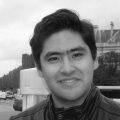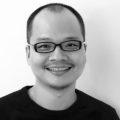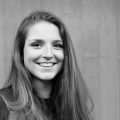
Computation is opening new ways for interacting with our structures. Within this context, current architectural paradigms are shifting from designing static building models to the design of more dynamic and behavioral ones. Structures can now be designed to physically respond to stimulus coming from dynamic and unpredictable environments for improving design criteria performances. That is, enhancing the habitability and sustainability of structures through custom adaptations based on specific needs. Bending-active systems provides a novel source for innovation in this realm given its aesthetic and material efficient qualities, and its intrinsic capacities to support reverse elastic deformation for the development of kinetic systems. However, the problem of designing such structures relies on the unpredictability of its geometrical shape. Contrary to standard design processes where shape can be defined in advance, the final geometrical configuration of these flexible structures relies on the integration of material behavior as the main agent driving the entire formation process.
The first edition of the GSS Quito will focus on the ongoing research conducted at the Institute for Building Structures and Structural Design (ITKE) regarding the conceptual design of such lightweight structures. The workshop aims to explore non-standard dynamic articulations of form- and bending-active elements by bridging the gap between physical and digital models. During the workshop, participants will take part exploring the integration of highly intuitive and interactive physically-based techniques within parametric and associative modelling environments, digital fabrication protocols and natural materials. The GSS Quito will end with the fabrication of a large-scale demonstrator aiming to open a discussion regarding adaptive lightweight structures and its role in the sustainable development of our building environment.
IAAC Global Summer School is a full-time two weeks course, 2-14 July 2018, that provides both practical and theoretical knowledge. The program is led by expert tutors, combined with lectures by renowned professionals and academics relevant to the topics to be treated during the course. These will be broadcasted in the different node-cities, all globally connected. Participants will join a global agenda and an international laboratory at their disposal to test their design hypothesis, understanding how design conclusions derived locally can be tested and evolved globally in the different cities where other teams reside.
During the GSS Quito, intensive tutorials and evening lectures will be organized to introduce students to computational design thinking methodologies, as well as techniques for physical form-finding by tutors from leading design research programs (ITKE – University of Stuttgart) and professionals from the field of architecture and engineering (Knippers Helbig Advanced Engineering).
Introductory sessions are going to be organized for participants in topics ranging from parametric and associative modelling to prototyping and electronics. Students will acquire basic knowledge and understanding of flexible structures and dynamic methods for form-finding through theoretical and practical sessions. The core of the workshop is the study and implementation of highly intuitive and interactive form-finding processes for the design of a final demonstrator. Additionally, students will build in parallel small-scale models for comparing and validating numerical simulations.

Seiichi Suzuki is a research associate and doctoral candidate at the Institute of Building Structures and Structural Design (ITKE) at the University of Stuttgart. His work is focused on the development of advanced numerical form-finding strategies for enhancing user-model interactions while extending the design space freedom of lightweight structures. He is a licensed architect that holds a master’s degree in advanced architecture from the Institute for Advanced Architecture of Catalonia (IAAC, Barcelona) and a master’s degree in advanced design and Digital Architecture from the Pompeu Fabra University (UPF, Barcelona). He is teaching within the Integrative Technologies and Architectural Design Research (ITECH) Master Program and worked as a tutor at the Architectural Association Visiting School. His work has been published widely in international journals and conferences.

Dr.-Ing. Jian-Mi Li is a senior structural engineer at Knippers Helbig Advanced Engineering since 2014. He holds a bachelor’s in physics from the National Tsing Hua University in Taiwan and a master’s degree in physics from the National University of Taiwan. Between 2010 and 2014, he held a research position at the Institute for Building Structures and Structural Design (ITKE). At ITKE, he worked on the scientific development of the “Landesgartenschau” Exhibition Hall that was later awarded with the German Design Award (2016) and German Wooden Building Award (2015). In 2017, Jian-Mi Li received his Ph.D. with the dissertation “Timber shell structures: form-finding and structural analysis of actively bent grid shells and segmental plate shells”. His work has been published widely in international journals and conferences.

Evy L. M. Slabbinck is a Research Associate and doctoral candidate at the Institute of Building Structures and Structural Design (ITKE) at the University of Stuttgart. She holds a “Master of Science in Architectural Engineering” from the Vrije Universiteit Brussel and a Master of Science from the University of Stuttgart. She gained her professional experience in various international practices where she worked as a membrane engineer and computational specialist in several international projects. She started her research under supervision of Prof. Dr.-Ing. Jan Knippers in September 2015 as part of the Innochain PhD research network. Her research project focuses on multiple states of equilibrium for bending-active (tensile) structures in collaboration with Foster + Partners and McNeel Europe. Her work has been published widely in international journals and conferences.
Prof. Dr.-Ing. Jan Knippers is a civil engineer from the Technical University of Berlin, from where he also received his Ph.D in 1992. Since 2000, he is the director of the Institute for Building Structures and Structural Design (ITKE) at the Faculty for Architecture and Urban Planning at the University of Stuttgart. His research looks for breaking standard structural typologies through the design and conceptualization of more efficient structural systems using new technologies in construction. This engages the engineering and construction of complex geometries, the use of innovative building materials, like fiber-reinforced composites, and biomimetic design. Since 2014 he is coordinator of the collaborative research center ‘Biological Design and Integrative Structures’ that aims to contribute to the conceptualization of biomimetics as a scientific discipline in the context of architecture. Prof.Knippers was co-founder of Knippers-Helbig Advanced Engineering. The focus of their work is on efficient structural design for international and architecturally demanding projects, as the One Ocean Thematic Pavilion in South Korea and the EXPO Axis, Shanghai.
Camilo Cifuentes Quin holds a Bachelor of Architecture from Los Andes University, a Postgraduate Diploma in Computational Design from ELISAVA (Barcelona School of Design and Engineering), a Masters of Architecture from ENSAG (École Nationale Supérieure d’Architecture de Grenoble), and a Ph.D. in Architecture from UPC-Barcelona Tech. He has practiced in Colombia and France in architecture firms such as Groupe 6 and Aktis Architecture, he has conducted investigations as a research fellow at Cresson Laboratory and at Rafael Viñoly Architects’ Training and Research Program, and from 2011 to 2013 he was assistant professor of digital design in the master Ambiances Architecture et Culture Numérique at ENSAG. Currently he is Associate Professor in the Faculty of Habitat Sciences at La Salle University, Bogotá, where he teaches design studios and courses on parametric design.
Axel Körner received his Diploma at the University of Applied Sciences in Munich 2008 and his MSc. in Emergent Technologies and Design from the Architectural Association in London 2013 with distinction. He worked for several architecture practices in Munich, Vienna and London between 2008 and 2014, as well as for Createx and Northsails TPT in Switzerland where he was working on carbon fibre material research in 2012. Between 2013 and 2014 he was tutor for Technical Studies at the AA School of Architecture and between 2013 and 2016 he was working as visiting tutor for EMTECH at the AA School of Architecture. Since October 2014 he has been a research associate at the Institute of Building Structures and Structural Design (ITKE), University of Stuttgart, where he is working on bio inspired compliant mechanisms for architectural applications. He is teaching within the Integrative Technologies and Architectural Design Research (ITECH) Master Program with focus on adaptive and bending active structures. Since 2016 he is organising workshops with the Contemporary Architects Association in Tehran, Iran and 2017 he was member of the international D.RE.A.M. Academy Faculty at Citta Della Scienza in Naples, Italy.
See Tutors sections for short biography.
Lotte Aldinger is a Research Associate at the Institute of Building Structures and Structural Design (ITKE) at the University of Stuttgart. She holds a Master of Science with distinction in Integrative Technologies and Architectural Design Research from the University of Stuttgart, and she has a background in structural engineering. Her master thesis ‘Tailoring Self-Formation. fabrication and simulation of membrane-actuated stiffness gradient composites’ focuses on a design-to-fabrication framework for a mold-less construction of double curved surfaces on the basis of material behavior. It was conducted, together with her colleague Georgia Margariti, and under the supervision of Prof. Jan Knippers and Prof. Achim Menges and tutored by Axel Körner and Seiichi Suzuki. It is now nominated for the upcoming Young Talent Architecture Award (YTAA 2018), organized as an extension of the Mies van der Rohe Award, and is accepted for the IASS 2018 conference.
See Tutors sections for short biography.
Saman Saffarian is an Architectural Designer, a Marie-Curie Fellow and a Research Associate at the Institute for Building Structures and Structural Design ( ITKE ) at the University of Stuttgart. He is currently pursuing his research interests as a PhD candidate within the InnoChain Research Network. His research project focuses on Design Development and Manufacturing of Climate Adaptive Building Envelopes and Exploring potentials of Material-Gradient-FRP as a material solution for Kinetic Applications. Prior to joining the ITKE in 2015, he worked as a Lead Designer for Zaha Hadid Architects in London, delivering Concept Designs for many projects and competitions of various scale and complexity. Additionally, in collaboration with ZHA-CoDe, he contributed to the development and fabrication of a number of experimental and research-based installations and exhibitions.”
James is a Chartered Engineer, a Marie-Curie Fellow working within the Innochain ETN Network and a Research Associate at the Institute for Building Structures and Structural Design (ITKE) at the University of Stuttgart. His current research focuses on the development of virtual prototyping strategies for the fabrication of novel fibre-reinforced polymer (FRP) material systems. Prior to his current academic role, James worked at Ramboll UK, BuroHappold Engineering and Format Engineers, delivering geometrically complex projects that ranged from experimental sculptures to international museum extensions. His work has been published widely in international journals and conferences.
Anja Mäder is a research associate and tutor at the Institute of Building Structures and Structural Design (itke) at the University of Stuttgart. She holds a bachelor in biomimetics and a master’s degree in Computer-Based Mechanical Enigineering from the Bremen University of Applied Science. Between 2011 and 2013, she held a research position at the Biological Materials Group from the Bremen University of Applied Sciences. Since 2015, she is a Ph.D. candidate at ITKE as part of the Collaborative Research Center SFB-TRR 141 for Biological Design and Integrative Structures. Her research project focuses on biological inspired pneumatic actuators for adaptive structures. Her work has been published widely in international journals and conferences.
See Tutors sections for short biography.
All the lectures and seminars are going to be hosted by the Pontifical Catholic University of Ecuador (PUCE), one of the most prestigious universities and also the oldest private university in Ecuador.
The FabLab Zoi will host the digital fabrication workshop and the final prototype will be be exhibited at the Interactive Museum of Science (MIC). All the locations are distributed around the central area of Quito, the capital of Ecuador.
Sylvia Jiménez (PUCE)
Sylvia Jiménez is the dean of the Faculty of Architecture, Design and Arts, at Pontifical Catholic University of Ecuador. She studied architecture at the Pontifical Catholic University of Ecuador and holds a master’s degree in Developing and Planning, and a research degree in Sustainable Design from University College London. Her academic work is focused on sustainable architecture and design with emphasis in thermal comfort with passive elements for living, working and research spaces.
Ekaterina Armijos (PUCE)
Ekaterina is an architect from the Pontifical Catholic University of Ecuador with a master’s degree in strategic and Innovation Management (Autonomous University of Barcelona) and a master’s degree in architecture and Contemporary Design (Central University of Chile). Currently, she is a lecturer and holds a research position at the Pontifical Catholic University of Ecuador.
Tannya Pico (PUCE)
Tannya Pico studied architecture at the Pontifical Catholic University of Ecuador and holds a master’s degree in integrated Renewable Energies for Architecture from the Polytechnic University of Catalunya. She is the current coordinator of the Architecture and Sustainability master program at the Pontifical Catholic University of Ecuador. Her research interest is focused on the development of a sensitive design methodology for designing sustainable architectures through the efficient use of environmental, social and economic conditions.
IAAC GSS is open to creative and innovative people who are interested in fields such as architecture, urban planning, digital fabrication, design, etc., searching for a multidisciplinary experience in an international environment. No previous skills are required, although CAD design, programming and digital fabrication skills are welcome. The official language of the course is English.
After the course, the participants will have gained theoretical and applicative knowledge about advanced design strategies. They will be familiar with parametric software, data visualization and use of digital machines. The last day of course participants will join a presentation of developed projects reviewed by a renown jury and will receive a Global Summer School Diploma.
Each participant is responsible to investigate which documents are required via the embassies in their country of origin. The school will provide a confirmation letter regarding the participation to the course, and will assist where possible the visa process.
Fee for Quito is 850 USD and includes all material costs needed for the course. No additional registration fee is required. Flight tickets, accommodation and food are not included in the fee. Each participant should bring his/her own computer with the software installed. Further details about the software will be given to the participants upon acceptance.
In order to register to the Global Summer School, participants need to submit the online application form, where they will be asked to fill their personal details and to upload a CV. Portfolio is not required. GSS18 dates are from 2-14 of July 2018 and applications are open until the 31st of May 2018 (EXTENDED UNTIL JUNE 27).
